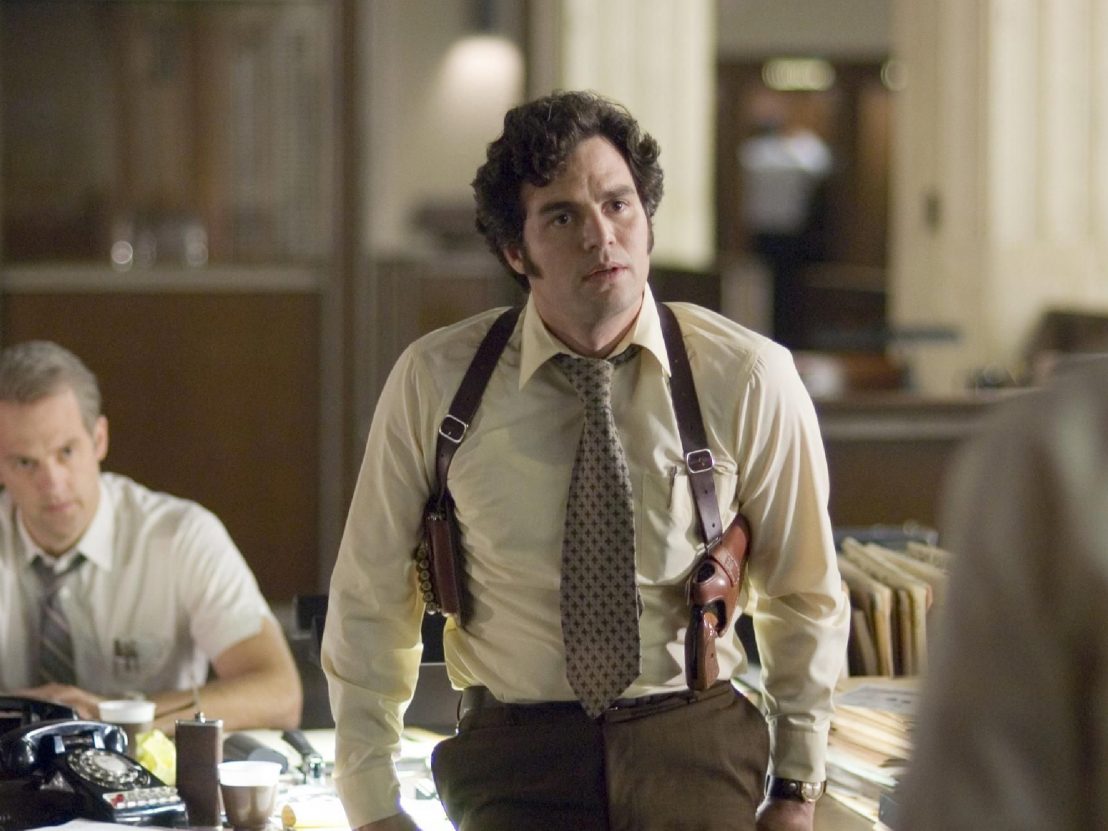
You can find out a lot about a person from the film role they automatically associate with Mark Ruffalo. Women who grew up in the mid-noughties? He’s Matt from the seminal teen movie 13 Going on 30. Those who were knee-high in 2012 when The Avengers came out? He’s the Incredible Hulk. Over the course of his career he’s been nominated for three Academy Awards, and his non-threatening brand of earnest, doe-eyed reassurance has made him a Hollywood mainstay. When he’s not making movies he’s campaigning for change or admiring Paul Rudd – it’s easy to understand why audiences love him, and why he’s ordinarily cast in rom-com roles that play to his crinkly-eyed crooked-smile charm.
One notable early outlier in his filmography is his performance as Inspector Dave Toschi in David Fincher’s 2007 crime thriller, Zodiac. Based on the investigation into the eponymous serial killer who terrorised San Francisco in the late ’60s and ’70s, the film paved the way for Fincher’s future forays into crime thrillers, notably his most recent, Mindhunter. It’s a meticulously crafted slow-burn which provides a unique insight into a case that has frightened and fascinated true crime enthusiasts for decades, honing in on the frustrating red tape which stunted the investigation, as well as how the case changed the lives of three men at the centre of it: Robert Graysmith, Paul Avery, and Dave Toschi.
Prior to Zodiac, Toschi was already a fascinating character – he was the inspiration for Clint Eastwood’s Harry Callahan in Dirty Harry, and Steve McQueen’s stylistic reference for Bullitt. In a 1993 interview with Empire, George Lucas even revealed he’d named a location on Tatooine ‘Tosche Station’ after him, having been obsessed with the case as a teenager and sympathising with the much-harangued police inspector. In bringing Robert Graysmith’s book charting the Zodiac case to the big screen, Fincher reignited interest and brought the story to a new generation of cinema-goers.
Fincher sought to cast Ruffalo on the advice of Jennifer Aniston, who had worked with him on The Graduate spin-off Rumour Has It…, though Ruffalo was initially not interested in the part. Following rewrites he came aboard as the bow tie-wearing, shoulder holster-sporting San Francisco detective – the grumpy foil to Jake Gyllenhaal’s naive Graysmith and Robert Downey Jr’s troubled Avery. In a rather unfortunate twist, Zodiac had to contend with Paul Thomas Anderson’s There Will Be Blood and the Coen brothers’ No Country for Old Men at the Oscars, meaning it missed out on formal recognition, but who needs golden statues when Ruffalo’s wearing a navy turtleneck and scowling at an evidence envelope?
When Toschi is introduced in the narrative, he’s rudely awakened in the middle of the night by the call that announces the Zodiac’s third attack. Having broken the bedside light while trying to get to the phone, he sighs into the receiver, “Whoever this is, you owe me a new lamp.” Ruffalo’s world-weariness underlines the film’s portrayal of police work as frustratingly mundane – a stark contrast from the glamour of typical Hollywood portrayals, exemplified in the likes of LA Confidential and Heat.
In the following scene, sporting a Columbo mac, he dissects the scene of Paul Stine’s murder in a methodical, routine manner, and then asks, nonchalant, if any of his colleagues “have any animal crackers”. At this early point in the narrative, apprehension of the killer still seems likely – Toschi’s all business, particularly when it comes to clashing with pesky reporter Paul Avery over the matter of the Zodiac letters being sent to the San Francisco Chronicle. “Have you ever thought Paul Avery might be the Zodiac?” an informant asks him. “Frequently,” quips Toschi in response.
As time drags on with the case still open, we see Toschi’s increasing frustration – both with Paul Avery’s own investigation into the Zodiac, and his own failure to apprehend the killer. The closest he comes is interviewing Arthur Leigh Allen – the prime suspect in the case. In this scene, Ruffalo’s soft-spoken nature most apparent, as Toschi serves primarily as an observer while his colleagues conduct the interview, and earn Allen’s scorn for their approach. Sensing this, Toschi politely asks to take a look at Allen’s watch (a potential clue, given its Zodiac branding) and uses the interaction to bring the conversation back to the interview.
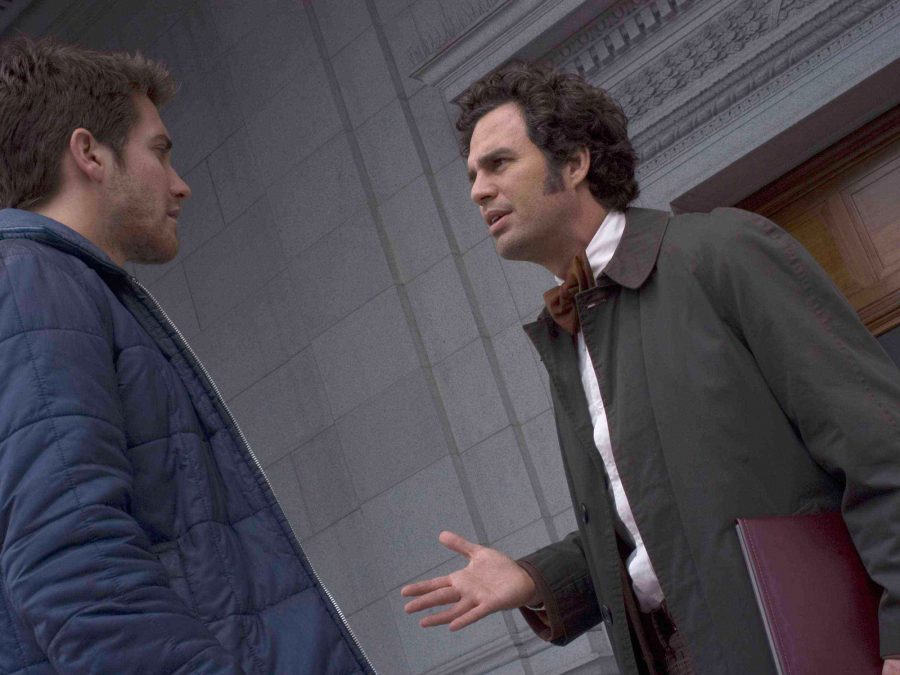
It’s not just Ruffalo’s resemblance to his real-life counterpart which makes his portrayal of Toschi so compelling. His positioning of Toschi between the spiralling obsession of Graysmith and Avery’s retreat into alcoholism following his involvement in the case presents audiences with a portrait of a decent man beset by extraordinary circumstances, stoic even when he himself is accused of being responsible for sending the Zodiac letters in order to drum up publicity for the case.
“You know what the worst part of this is?” he admits, having stormed out of the office following the announcement that Arthur Leigh Allen won’t be pursued as a suspect. “I can’t tell if I wanted it to be Allen so bad because I actually thought it was him, or I just want all this to be over.” He sighs heavily, leaning against the wall. While Paul Avery’s physical decline as time drags on, from sharp-suited journalist to dishevelled alcoholic, Robert Graysmith’s increasing isolation is seen through the breakdown of his marriage, Ruffalo’s portrayal of what Toschi loses to the Zodiac is more subtle. He might wear shoulder holsters at all times, but he never has cause in the film to fire his gun – Toschi’s not the gun-toting Harry Callahan in this story.
There’s a sense the Zodiac case haunts him – he walks out of a screening of Dirty Harry and smokes a cigarette in the lobby, staring at the ground. A resigned, irritated acceptance comes across. When Graysmith offers his reassurance, Toschi sighs. “Pal, they’re already making movies about it.” Eventually, his frustration with Graysmith’s Zodiac obsession develops into a strange admiration. Over breakfast, while Graysmith walks him through his years of unrelenting research, Toschi stares at him, incredulous, with a small smile playing on his tired features. He says, in a voice near enough a whisper, half-admiring half-incredulous, “Jesus Christ.”
Having gone on to play murdered Olympic athlete Dave Schultz in Bennett Miller’s Foxcatcher and the dogged journalist Michael Rezendes in Tom McCarthy’s Spotlight, Zodiac paved the way for Ruffalo’s future stand-out biographical roles. His quiet command of James Vanderbilt’s script and the perfect positioning of Toschi as a man beleaguered by the reality of police work as opposed to its pop culture portrayal. Without a smoking gun, Fincher’s film relies totally on the strength of its characters for success. Ruffalo’s unique combination of earnestness and brusqueness brings Toschi to life.
Published 5 May 2018
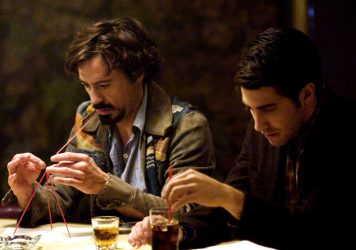
By Tim Cooke
The director’s true-crime chiller is as tricky and compelling as ever.
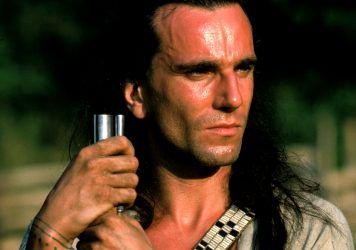
By Sam Bowles
He’s never been better than in Michael Mann’s historical epic.
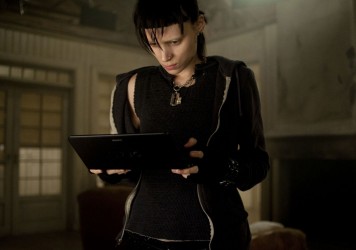
By Simran Hans
A look beyond the dominant male characters that inhabit the Gone Girl director’s cinema.